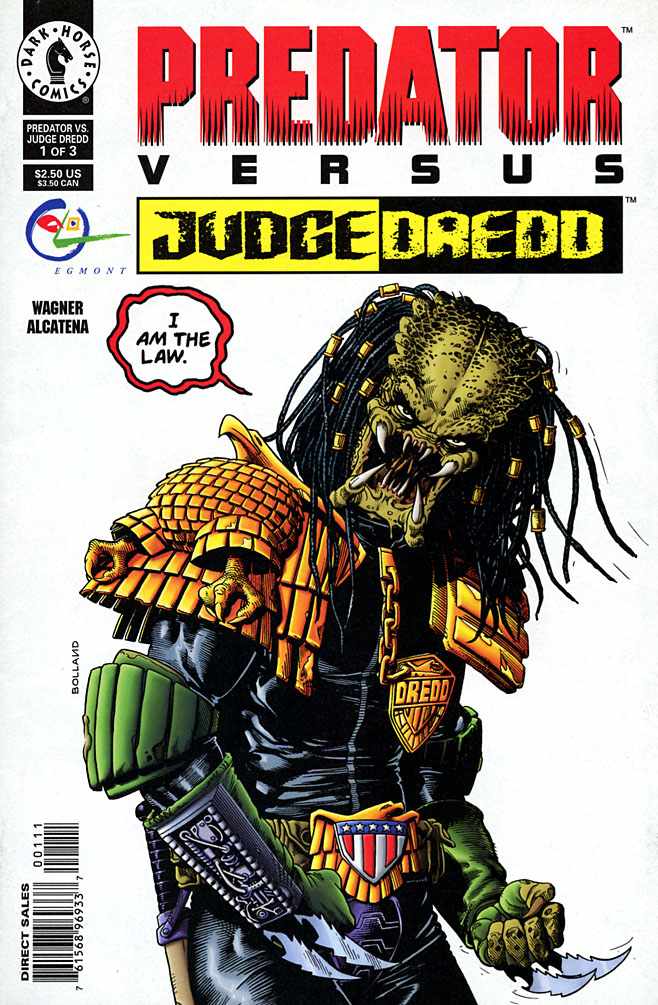NotTheGuyYouKill
Member
Just came across this piece on io9 about how Fox could/should potentially remake the Aliens/Predators/Prometheus Cinematic Universe, since that's all the rage nowadays.
http://observationdeck.io9.com/how-...pelling-alien-cinematic-1689080135/+tinaamini
It's quite lengthy, but I liked this bit:
There's a lot more. Worth a read.
So what do you guys think? AVP retread worth a shot?
I always considered Blade Runner and Alien to be in the same universe.
http://observationdeck.io9.com/how-...pelling-alien-cinematic-1689080135/+tinaamini
It's quite lengthy, but I liked this bit:
Of course, the nature of the horror at the heart of the Alien, Predator, and Prometheus films is quite different and if Fox wants to take a page from Marvel and build a cinematic universe around the films it would do well to remember another part of Marvel's playbook: each of the Marvel films has its own independent style, while maintaining certain overarching themes and characteristics. Iron Man 3 is a straight-forward action movie: RDJ's Tony Stark would easily fit in with the likes of John McClane, Martin Riggs, or Roger Murtaugh. The Winter Soldier is a 1970s-style political thriller taking its cues from All the President's Men and 3 Days of the Condor. Guardians of the Galaxy is a feel-good space adventure. They're all superhero films and they all share certain elements like snappy dialogue, straightforwardly heroic characters, but they also stand out individually.
Fox should do the same when it comes to its Alien, Predator, and Prometheus films. While each film needs to be scary and/or thrilling, they don't need to approach the subject in exactly the same manner. Indeed, they shouldn't. Each set of films really represents a different kind of horror.
The Alien films are perhaps the simplest to pin down: they're monster films and they're all about how terrifying and deadly the Aliens are. The Alien's the ultimate representation of the boogeyman or the monster under your bed: it will kill you just when you let your guard down and it will do so in a way that leaves you screaming until your last breath. They strike at the primal fear of being devoured by predators that still lives with us, millions of years after we've become apex predators ourselves. Beyond that, they also represent body horror, particularly that dealing with reproduction, and are a horrifying caricature of our society's anxieties about sex and pregnancy. The Aliens don't just eat us: they rape us first.
The Predator series, on the other hand, are slasher films. While the Aliens pursue and kill us because they need to, because it's their nature, the Predators do it because it's fun. Humans aren't food or even reproductive vessels, they're literally game, pursued for the thrill and the challenge of stalking prey that can fight back. And, as in many slasher films, there's a strange appeal to the killer(s): they're frightening and sadistic, sure, but hey, they're clever and have a code of honor. The Predators appeal to the same part of us that is simultaneously terrified by and enchanted by serial killers, that romanticizes characters like Hannibal Lecter and Dexter Morgan while still fearing the stranger in the night.
As for Prometheus? Your first clue should come from that fact that Guillermo del Toro was worried the first film in the series would sabotage his efforts to film an adaptation of At the Mountains of Madness. Prometheus is all about cosmic horror, also known as Lovecraftian horror. It's important to remember that when Prometheus starts, the main characters are fairly optimistic about what they'll find—or in the case of Vickers, disinterestedly pessimistic. No one expects to find a horror house waiting for them and no one expects that Shaw and Holloway's hypothesis about the origins of humanity would turn out to be horribly right. The Engineers created humanity yes, but their intentions are not benevolent and they are not the gods Shaw was looking for. And the mission's attempts to find answers only leads to death and madness. Prometheus, done properly, is Call of Cthulhu with a side of 2001, reminding us that those things which inspire awe are often awful as well.
Alien vs. Predator, should Fox choose to revisit the concept, should be predominantly horrifying in its own, unique manner as well. While the earlier two attempts at the crossover largely focused on the titular monsters carving each other up a better film built on the same idea should examine the human consequences of their conflict more thoroughly. The best of the AVP comics note how catastrophic the war between Aliens and Predators are to the humans who get caught in the middle, incidental bystanders who get swept up in a war that really isn't about them. Really, a good screenwriter could turn the AVP concept into a tense and harrowing parable of the horrors of war and the suffering those who end up as collateral damage inevitably endure. Consider the battle scenes of Children of Men or the horrific violence of the film Fury and add xenomorphs, Predators, or Engineers on top of that and you get an idea of where a film like that could go.
If Fox is going to build a cinematic universe out of the Alien, Predator, and Prometheus properties, one of the things they're going to want to do is establish a common framework around which the films are built. Just as the Marvel films have been built around a number of common threads like the Infinity Stones, SHIELD, and Stark Industries, so would one expect a shared universe consisting of Fox's space horror films to exhibit a few details that are passed around between one film to another, creating a sense that each film is part of a bigger world.
Starting with the basics, when you come right down to it you can sum up the Alien universe in one very simple way that gets across the multitude of its themes and styles: Cthulhu meets Blade Runner.
Like Lovecraft's immortal mythos, the Alien universe deals regularly with extraterrestrial threats to humanity that surpass our attempts to control or understand them, which put us in jeopardy just by existing. For all our aspirations to technological supremacy or mastery of nature, the Alien films (and Prometheus) echo Lovecraft's thesis that humanity is inconsequential and at constant risk of stumbling onto its own destruction. This is a world where our creators have forsaken us, where we're food and reproductive fodder for horrifying parasites, and our level of sophistication is so insignificant that we're pursued for sport by extraterrestrial safari hunters. Humans are still at the bottom of the interstellar food chain, despite all we've accomplished.
How to Make a Cohesive (and Compelling) Alien Cinematic Universe
And as in Blade Runner (and the cyberpunk genre it helped create) the world we've created for ourselves, the sanctuary that preserves our illusion of safety from a deeply hostile universe, isn't the one we hoped for. The human world is dominated not by philanthropic and democratic utopias like the Federation of Star Trek but by misanthropic, cynical corporations that treat their employees as expendable assets and strip mine planets for precious resources. Space travel, far from being the extravagant adventure of classic space opera is hard, dirty, and dangerous and it takes days at a minimum (weeks more likely, months from time to time) to travel from one star system to another. This is a world that exposes the idea that the Millennium Falcon could jump "halfway across the galaxy" in seconds for the absurdity that it is.
The world of the Alien films isn't exactly a dystopia in the same sense that the worlds of 1984 or The Hunger Games are—there's no world-spanning totalitarian government and evidence seems to suggest that most people's socioeconomic status is roughly comparable to that of our own world—but it's still a world that's half-empty. Humanity's discovered the secret to FTL but space colonies are far flung and remote, dependent on fragile technology for their survival. Artificial intelligence is widespread and commonplace, but shackled by a repressive and suspicious society that regards synthetics as somewhere between citizens and property. We aren't alone in the universe, but the few species we've encountered are inscrutable if not outright hostile.
There's a lot more. Worth a read.
So what do you guys think? AVP retread worth a shot?
I always considered Blade Runner and Alien to be in the same universe.






